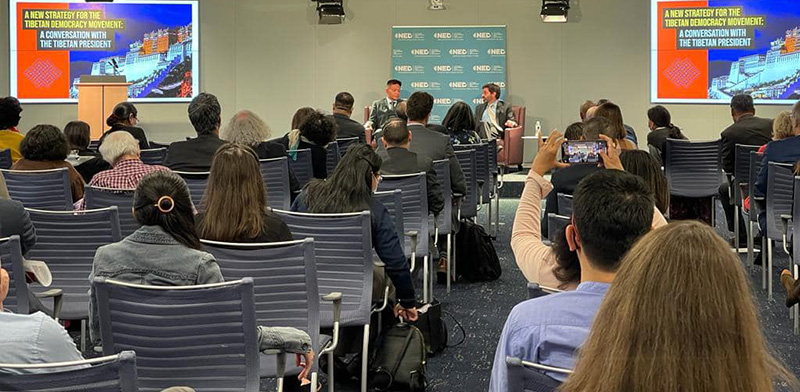Washington D.C — Sikyong of Central Tibetan Administration, in a dialogue titled ‘A New Strategy for the Tibetan Democracy Movement: A Conversation with the Tibetan President’, he said, “I want to say that we are with the people of Ukraine and when things were happening there, it reminded us of China's invasion of Tibet in 1950.”
On April 26, the National Endowment for Democracy (NED) hosted a dialogue with Sikyong Penpa Tsering, entitled "A New Strategy for the Tibetan Democracy Movement: A Conversation with the Tibetan President," moderated by NED Vice President Brian Joseph. NED is an independent, nonprofit foundation dedicated to the growth and strengthening of democratic institutions around the world. In his first public interview in the United States since taking office, the Tibetan President spoke of the difficult task of negotiating with China that shows no willingness to discuss any aspect of its rule in Tibet.
NED President and CEO Damon Wilson said in his welcoming speech, that NED respects Tibetans for their commitment to freedom. He also paid tribute to His Holiness the Dalai Lama, saying, "Once in exile, he immediately implemented significant democratic reforms. And today, Sikyong Tsering leads the administration that is a model of a thriving democracy in exile." He added that the NED is proud of its association with the Tibetan community and mentioned the presentation of the Democratic Service Medal to His Holiness, which is the highest award given by the NED.
Sikyong began his speech by thanking the NED for the opportunity and ally it has provided to the Tibetan cause over the years. Regarding His Holiness' vision for a democratic Tibet, he added: "If you go back in time, His Holiness visited China in 1954-55 and saw how communism worked. He stayed in China for almost a year and had many conversations with Mao Zedong and Zhou Enlai and His Holiness still says that at that time, even though everything seemed very disciplined, people were not allowed to say what they thought; And when His Holiness came to India in 1956-57, he found that when he visited the Indian parliament, even though it was very chaotic, he found that everyone had the freedom to say what they thought. When we came into exile, less than a year later, His Holiness introduced democracy in 1960 and we are still prospering." Sikyong also spoke of Tibetans' commitment to democracy and diversity, despite difficulties, and noted that any form of division in their society is caused by the Chinese.
So for China, international laws and agreements are accepted if they are in its favor, and if they are not, it does not care about international law. That's why I keep saying that if anyone respects international law today, it's with a lot of skepticism, especially because of what's happening today in Ukraine and the reaction of the international community and the members of the Security Council. With respect to Tibet, as we have been thinking about this since Ukraine was brought up, I want to say that we stand with the people of Ukraine and when things happened there, it reminded us of China's invasion of Tibet in 1950."
Sikyong Penpa said, "Right now, with the way Xi Jinping is ruling not only Hong Kong but also the Uyghurs, on the industrial scale of what happened there - I deliberately use the word Uyghur because when you use the word Xinjian, that's the name given by China to the Uyghur people, and you are legitimizing China's words. So I try to refrain as much as possible; even Mongols like to be called Southern Mongols and not Mongols, and China tried to use Xizang for Tibet for two or three weeks, but it didn't work because nobody knew what Xizang was."
When the discussion turned to political alliances on the international front and how this might benefit the Tibetan struggle in terms of support from Washington, Sikyong responded that the United States and the Western world had contributed to China's economic development, but now the United States and Europe realised China's true intentions. He added, “the reaction from the US government right now we feel it is on the right track and Europeans also."
The conversation also touched upon the abduction of Panchen Lama and how that had implications for the spiritual and political freedom for Tibetans under the Chinese rule. There were also discussions about the Tibetan refugees and diaspora – when asked about plans regarding that, Sikyong responded, “there are many challenges for the Tibetan community in diaspora and one of the challenges is of course the changing demographic and the social system, but we try to find to turn every challenge into an opportunity.
When asked about the possibility of breaking the control of information and resuming talks with China, Sikyong said, "We are not against the Chinese people, the majority of Chinese people suffer as much as we do, maybe a little less than the Tibetans, Uyghurs, Mongolians and Hong Kong people. So, His Holiness was very wise to have this policy to reach out to the Chinese people as much as possible. those moves have been very useful in creating on this better understanding between the communities that faces the same kind of repression from the same government.”


![Tibet has a rich history as a sovereign nation until the 1950s when it was invaded by China. [Photo: File]](/images/stories/Pics-2024/March/Tibet-Nation-1940s.jpg#joomlaImage://local-images/stories/Pics-2024/March/Tibet-Nation-1940s.jpg?width=1489&height=878)
















